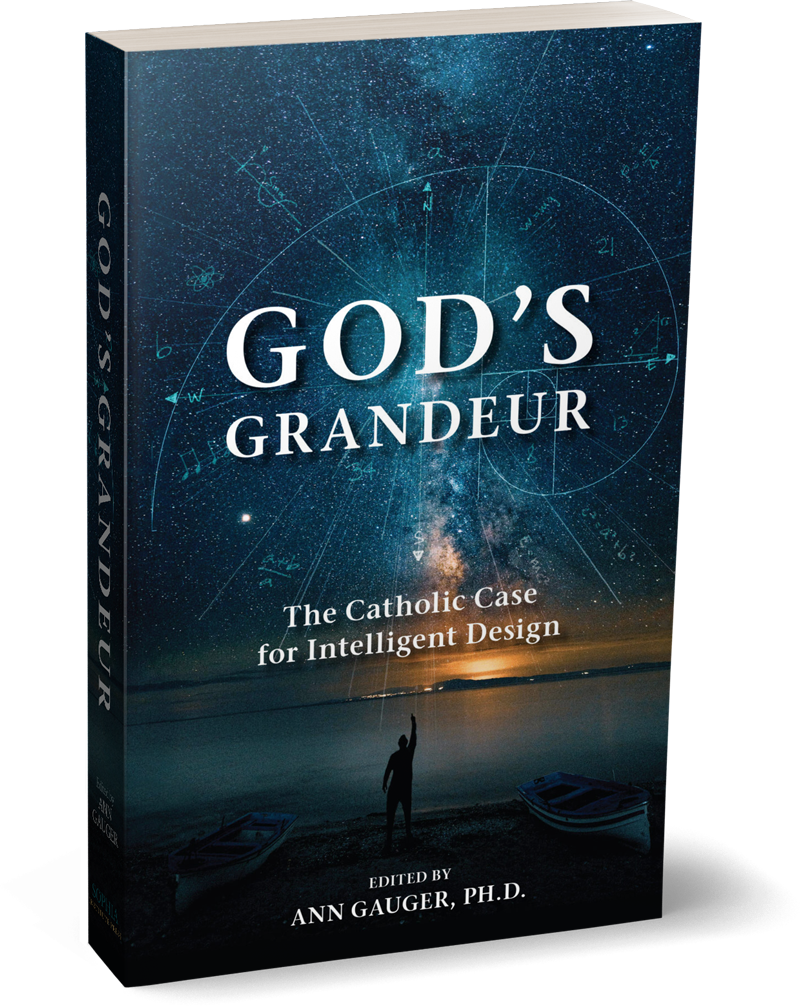

In God’s Grandeur, leading Catholic scientists and theologians argue that nature points to God by displaying stunning evidence of intelligent design. Get your copy now, or download a free chapter plus the table of contents.
The most compelling case yet for an ‘intentional and intelligent’ Designer.
Brian Gail, Catholic novelist
More about God’s Grandeur ⇕
We are not some casual and meaningless product of evolution. Each of us is the result of a thought of God. Each of us is willed, each of us is loved, each of us is necessary.
Pope Benedict XVI
The world — indeed, the universe — is charged with grandeur. Everything speaks of its beauty, power, and purpose — of its exquisite and intelligent design. Yet many scientists today flatly deny that the world was intelligently designed. Even some Christian scientists and theologians downplay or deny the evidence nature supplies of intelligent design, especially in biology. This thought-provoking anthology shows why they are wrong, why it matters, and why intelligent design provides a compelling way to reconcile science and faith in today’s culture.
God’s Grandeur challenges the claim that God’s design in nature is hidden and cannot be detected. It presents convincing scientific evidence of intelligent design in cosmology, the origin of life, and biology. It clears up common misunderstandings about how Catholic theology relates to debates over science, evolution, and intelligent design.
Contributors
Edited by biologist Ann Gauger, God’s Grandeur features chapters by an array of distinguished Catholic scientists, philosophers, theologians, and laypeople, including Lehigh University biochemist Michael Behe, author of Darwin’s Black Box and Darwin Devolves; award-winning brain surgeon Michael Egnor; noted theologian John Bergsma, author of Stunned by Scripture: How the Bible Made Me Catholic and A Catholic Introduction to the Bible: Old Testament; Fr. Pedro Barrajón, LC, Rector of the European University in Rome; Jay Richards, co-author of The Privileged Planet and editor of God and Evolution; Fr. Michael Chaberek, author of Aquinas and Evolution; Benjamin Wiker, author of The Catholic Church and Science and Director of Human Life Studies at Franciscan University of Steubenville; philosopher J. Budziszewski, author of numerous commentaries on works by Thomas Aquinas for Cambridge University Press; Bruce Chapman, founder and chairman of Discovery Institute; and Anthony Esolen, translator of Dante’s Divine Comedy and author of Reclaiming Catholic Social Teaching, The Politically Incorrect Guide to Western Civilization, and other books.
Praise
God’s Grandeur stimulates us all to investigate current scientific knowledge with the question of how a loving God made His most beloved children. Since we are not an accident, then how we came to be is a most important question of our times. Surely this discussion needs to occur with vigor and intellectual honesty within the Church itself.
Sam Brownback, former U.S. Senator, Governor, and U.S. Ambassador-at-Large for International Religious Freedom
The most compelling case yet for an ‘intentional and intelligent’ Designer.
Brian J. Gail, Catholic novelist and speaker, Knight of the Immaculate, author of Fatherless
Without an acknowledgement of intelligent design, one cannot have an objective ethic which is universally binding on all people. This book should be read by every teacher in Catholic schools, and essays from the book should be assigned to students in the upper grades. These essays will contribute greatly to confirming in people’s minds that there is a Creator God who can be known by the intelligibility of what we encounter in the order of nature and that living out an objective morality is essential for human happiness.
John M. Haas, Ph.D., S.T.L., M.Div., John Cardinal Krol Professor of Moral Theology, St. Charles Borromeo Seminary, The Archdiocese of Philadelphia
A most welcome gift to all of us who have been searching for a long time for a comprehensive, interdisciplinary approach to this fascinating and important subject.
Robert Stackpole, S.T.D., Director, John Paul II Institute of Divine Mercy
A new science-faith synthesis is needed, and God’s Grandeur offers a welcome contribution to the formation of this synthesis.
Brett T. Feger, M.S., M.A., Instructor of Biology, Ave Maria University
God’s Grandeur… shows up the lack of empirical evidence for Darwinism and specifically makes clear to Catholics what are the philosophical and theological consequences of kowtowing to it. I hope that many Catholics (and other truth seekers) will read it.
Fr Martin Hilbert, C.O., M.A.Sc., Ph.D., Lecturer in the Philosophy of Science at St Philip’s Seminary, Toronto, Canada.
In God’s Grandeur, scientists of all kinds… will help you to see and appreciate the grandeur of the divine art and the Divine Artist. Thanks be to God for these Catholics, all professionals in their respective fields, who have the courage to bring the light of truth to shine… This collection of essays should be read and reread by every Catholic Bishop and educator in America!
Luke A. Macik, J.D., Headmaster, The Lyceum
Contents by Chapter
- God’s Grandeur. The poem from which the title is drawn, and a preface that explains why this book is needed. Ann Gauger
- Intelligent design. What we mean by the term, and what we don’t mean. All too often people think they know what ID is, and what it claims, and they are wrong. Logan Gage
- Cosmology. The universe had a beginning, before which there was nothing — no time, no space, no matter, no energy, no sub-atomic particles or forces, nothing. Then it came into being so finely tuned for galaxies and stars, for a planet like earth, and for beings like us, that it boggles the mind. Brian Miller
- Origin of life. A pure thermodynamic miracle. Brian Miller
- How our understanding of biology has grown, and how it reveals intelligent design. Michael Behe
- Biology. Codes, information, molecular machines, causal circularity, and homeostasis, all things that require all the parts to be there and fine-tuned for each other before anything can work. Ann Gauger
- Paleontology. How the fossils indicate jumps, sometimes very large ones, over very short time intervals. There may be no intermediates, or even where it looks like there are intermediates, there isn’t enough time. Günter Bechly
- Human origins. What the science tells us, and what our faith tells us, and whether or not they can be reconciled. Ann Gauger
- The intelligibility of the universe. Why our minds are capable of understanding more and more about the way the universe works in physics, chemistry, and biology, and how this understanding conforms so well to mathematical abstract systems discovered by human minds. Benjamin Wiker
- Teleology and the universe. Why everything has a purpose, often multiple purposes, that affect the environment for the good of others, not just themselves. These purposes work together to permit the functioning of the whole of life. Rob Koons
- Consciousness. Somehow mind emerged from matter, mind capable of knowing itself and others, and communicating with them; capable of imagining and creating new things, and organizing its environment in a variety of ways; capable of a sense of the Other and of our immortality. Michael Egnor
- The uniqueness of the human person. Scott Ventureyra
- Natural law. How science supports and accounts for our natures. Benjamin Wiker
- Natural moral law. The law that is in us, that tells us what is wrong or right, that is the basis of morality. J. Budziszewski
- Beauty. The world is full of beautiful things, things that are gratuitously beautiful. They don’t have to be beautiful to fulfill their purpose, but they are. And we are built to see that beauty, whether it is natural, or man-made art, music, dance, etc. Logan Gage
- The language of design in the Bible. John Bergsma
- How the glory of God is revealed in creation. Fr. Pedro Barrajon, LC
- Is evolution a problem for the Church? Fr. Michael Chaberek, OP
- Aristotle and Design. Richard Sternberg
- Aquinas and design. Fr. Michael Chaberek, OP
- Can Thomist philosophers claim God acts only through secondary causes? Does God hide behind the apparent randomness of mutations? Jay Richards
- Why it is important for ID and evolution to be openly discussed in the Church. Bruce Chapman
- A closing chapter on creation as a living and symphonic order, not deterministic, but also not random, and full of beauty. Anthony Esolen